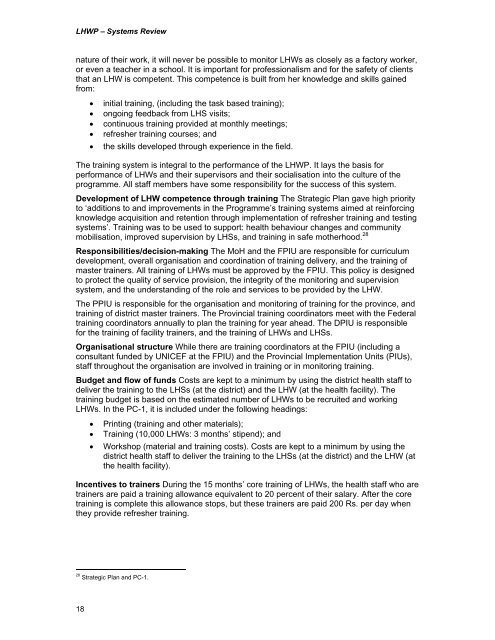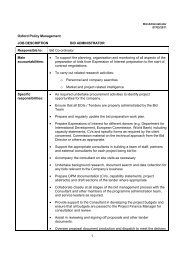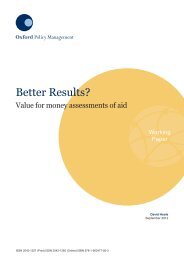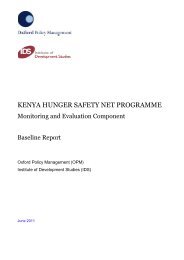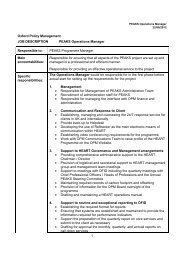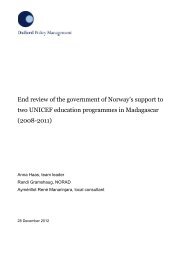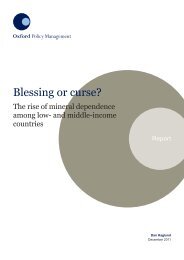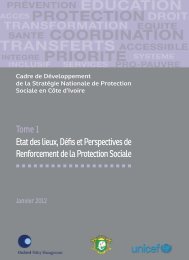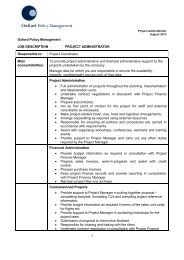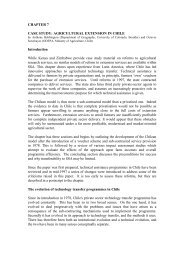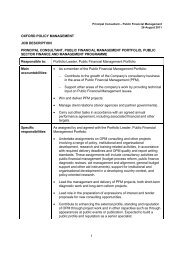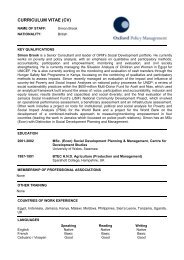LHW Systems Review - Oxford Policy Management
LHW Systems Review - Oxford Policy Management
LHW Systems Review - Oxford Policy Management
You also want an ePaper? Increase the reach of your titles
YUMPU automatically turns print PDFs into web optimized ePapers that Google loves.
<strong>LHW</strong>P – <strong>Systems</strong> <strong>Review</strong>nature of their work, it will never be possible to monitor <strong>LHW</strong>s as closely as a factory worker,or even a teacher in a school. It is important for professionalism and for the safety of clientsthat an <strong>LHW</strong> is competent. This competence is built from her knowledge and skills gainedfrom:• initial training, (including the task based training);• ongoing feedback from LHS visits;• continuous training provided at monthly meetings;• refresher training courses; and• the skills developed through experience in the field.The training system is integral to the performance of the <strong>LHW</strong>P. It lays the basis forperformance of <strong>LHW</strong>s and their supervisors and their socialisation into the culture of theprogramme. All staff members have some responsibility for the success of this system.Development of <strong>LHW</strong> competence through training The Strategic Plan gave high priorityto ‘additions to and improvements in the Programme’s training systems aimed at reinforcingknowledge acquisition and retention through implementation of refresher training and testingsystems’. Training was to be used to support: health behaviour changes and communitymobilisation, improved supervision by LHSs, and training in safe motherhood. 28Responsibilities/decision-making The MoH and the FPIU are responsible for curriculumdevelopment, overall organisation and coordination of training delivery, and the training ofmaster trainers. All training of <strong>LHW</strong>s must be approved by the FPIU. This policy is designedto protect the quality of service provision, the integrity of the monitoring and supervisionsystem, and the understanding of the role and services to be provided by the <strong>LHW</strong>.The PPIU is responsible for the organisation and monitoring of training for the province, andtraining of district master trainers. The Provincial training coordinators meet with the Federaltraining coordinators annually to plan the training for year ahead. The DPIU is responsiblefor the training of facility trainers, and the training of <strong>LHW</strong>s and LHSs.Organisational structure While there are training coordinators at the FPIU (including aconsultant funded by UNICEF at the FPIU) and the Provincial Implementation Units (PIUs),staff throughout the organisation are involved in training or in monitoring training.Budget and flow of funds Costs are kept to a minimum by using the district health staff todeliver the training to the LHSs (at the district) and the <strong>LHW</strong> (at the health facility). Thetraining budget is based on the estimated number of <strong>LHW</strong>s to be recruited and working<strong>LHW</strong>s. In the PC-1, it is included under the following headings:• Printing (training and other materials);• Training (10,000 <strong>LHW</strong>s: 3 months’ stipend); and• Workshop (material and training costs). Costs are kept to a minimum by using thedistrict health staff to deliver the training to the LHSs (at the district) and the <strong>LHW</strong> (atthe health facility).Incentives to trainers During the 15 months’ core training of <strong>LHW</strong>s, the health staff who aretrainers are paid a training allowance equivalent to 20 percent of their salary. After the coretraining is complete this allowance stops, but these trainers are paid 200 Rs. per day whenthey provide refresher training.28Strategic Plan and PC-1.18


